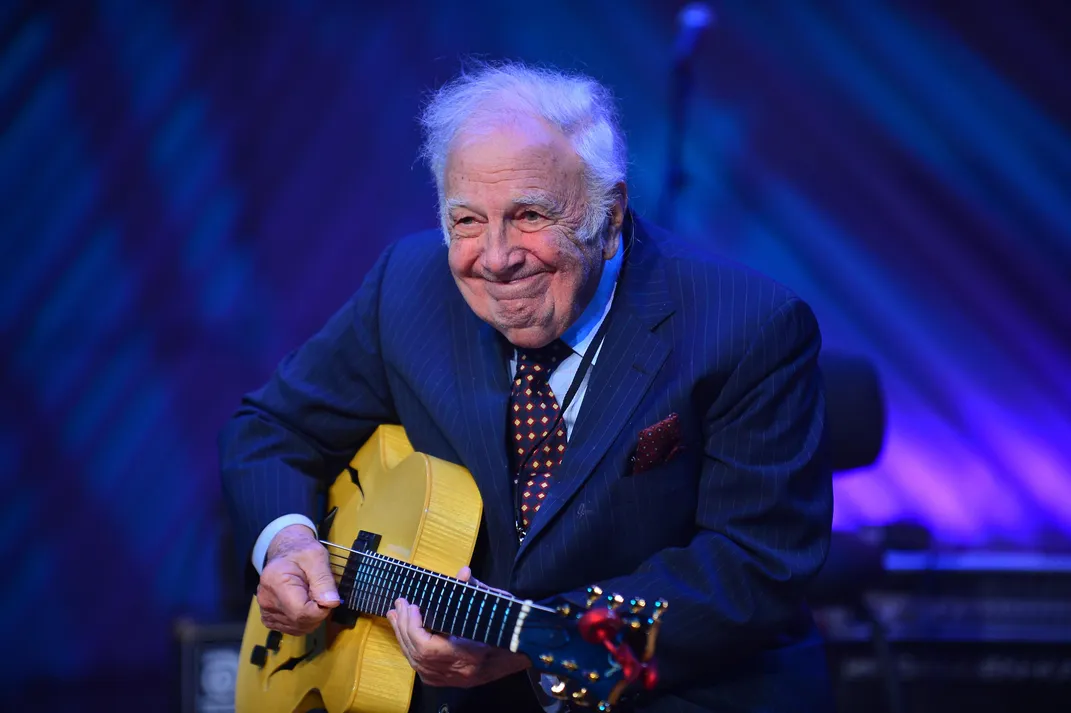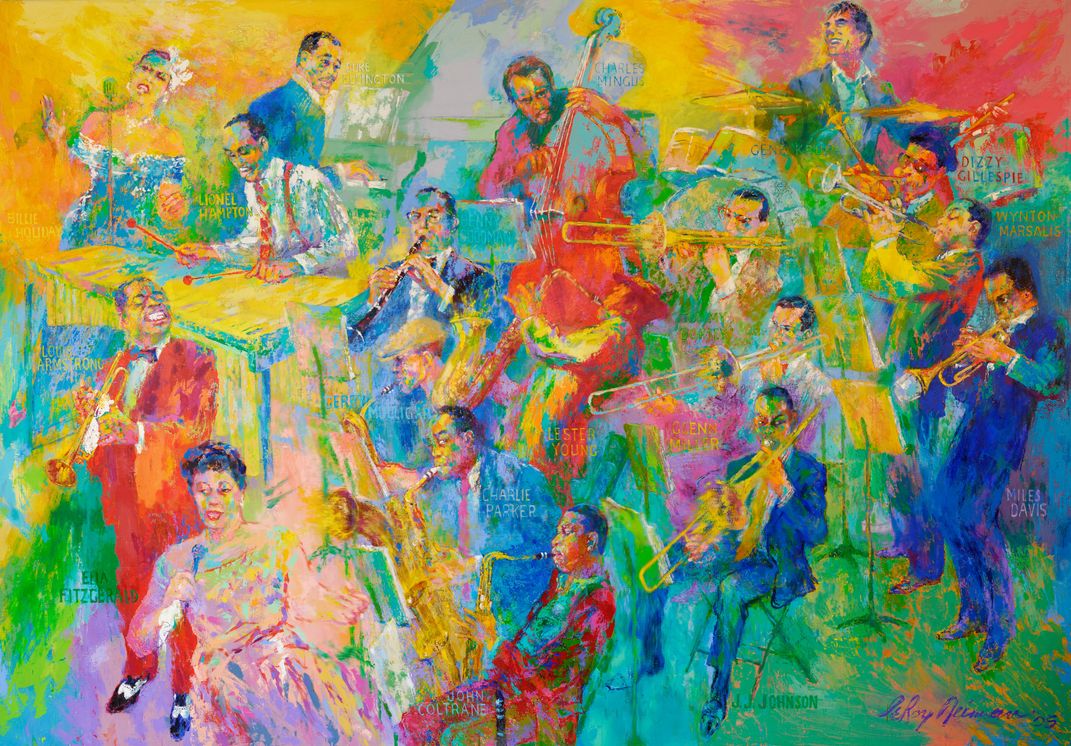COVID-19 Claims the Lives of Three Jazz Greats
Pianist and educator Ellis Marsalis Jr., trumpeter Wallace Roney, and guitarist Bucky Pizzarelli succumbed to complications caused by the novel coronavirus
:focal(1304x597:1305x598)/https://tf-cmsv2-smithsonianmag-media.s3.amazonaws.com/filer/0e/1d/0e1d9f10-7152-41b2-aff1-e6661a8c3dd1/my_post_1.jpg)
The jazz world lost three of its most legendary musicians to COVID-19 this week.
Trumpeter Wallace Roney died Tuesday in New Jersey, pianist and educator Ellis Marsalis Jr. died Wednesday in New Orleans, and guitarist Bucky Pizzarelli died on Wednesday in New Jersey. They were 59, 85 and 94, respectively.
Ellis Marsalis Jr.: A Father and Mentor to Jazz Players
/https://tf-cmsv2-smithsonianmag-media.s3.amazonaws.com/filer/14/92/14920401-a75b-47eb-84b8-fed2015af2b8/gettyimages-158784257.jpg)
Marsalis was a towering figure of modern jazz. Through his teaching, he became the patriarch of a musical family that extended well beyond the four sons who followed in his footsteps, report Janet McConnaughey and Rebecca Santan for the Associated Press.
“Ellis Marsalis was a legend,” wrote Mayor LaToya Cantrell of New Orleans, where the musician spent most of his life, on Twitter Wednesday night. “He was the prototype of what we mean when we talk about New Orleans jazz.”
The Marsalis family patriarch held teaching positions at the New Orleans Center for Creative Arts, Virginia Commonwealth University and the University of New Orleans. He had retired just this year from a three-decade stint playing weekly gigs at a small New Orleans club called the Snug Harbor Jazz Bistro.
“With the passing of Marsalis, we have lost not only a gifted pianist, but also a person committed to the importance of music education and jazz history,” says Theo Gonzalves, curator of cultural and community life at the Smithsonian Institution’s National Museum of American History.
Marsalis was known for his talents on the piano—he played alongside such greats as Cannonball Adderley and recorded more than 15 albums—but he was proudest of his legacy as a mentor and educator who carefully shepherded the next generation of musicians, including four of his six sons, reports Andrew Limbong for NPR.
“He was like the coach of jazz. He put on the sweatshirt, blew the whistle and made these guys work,” Nick Spitzer, host of public radio’s “American Routes” and a Tulane University anthropology professor, tells the AP.
Marsalis’ son Wynton is a trumpeter, as well as the artistic director of jazz at New York’s Lincoln Center. Branford took up the saxophone, leading “The Tonight Show” band and touring with Sting. Delfeayo, a trombonist, is a prominent producer and performer. Jason is a drummer of note with his band and as an accompanist. Marsalis’ two other sons—Ellis III, a poet-photographer, and Mboya—did not pursue music.
“My dad was a giant of a musician and teacher, but an even greater father. He poured everything he had into making us the best of what we could be,” says Branford in a statement.
Despite hailing from New Orleans, with its eponymous style of jazz, Marsalis’ musical heroes were virtuosic purveyors of bebop, including Charlie Parker and Thelonious Monk. His devotion to “straight-ahead jazz” trickled down to his sons, as well as other musicians he taught, including Terence Blanchard, Donald Harrison Jr., Harry Connick Jr. and Nicholas Payton, report Giovanni Russonello and Michael Levenson for the New York Times.
Marsalis’ children and students became the vanguard of “a burgeoning traditionalist movement, loosely referred to as the Young Lions,” write Russonello and Levenson in the Times. Roney, the trumpet player who died Tuesday, was one of these students.
In 2010, musician Anthony Brown and Ken Kimery, program director of Smithsonian Jazz, interviewed Marsalis for the Smithsonian Jazz Oral History Program. Recounting the conversation now, Kimery says the pianist “afforded us great insight into his family history, life in New Orleans,” favorite musicians and education, among other topics. The full transcript of the interview is available here.
Wallace Roney: Young Lion and Miles Davis Protégé
/https://tf-cmsv2-smithsonianmag-media.s3.amazonaws.com/filer/14/a5/14a514eb-cc4b-4d61-8f90-a30bbe8e9d24/gettyimages-121053931.jpg)
Horn player and composer Wallace Roney was one of the “Young Lions” influenced by the Marsalises, but his chief association is with his idol and mentor, Miles Davis.
A pivotal moment in the pair’s relationship took place at the 1991 Montreux Jazz Festival, reports Nate Chinen for NPR. Davis, recruited by producer Quincy Jones to perform two of his albums, insisted that Roney, who stood in for him during rehearsals, join him onstage.
The younger musician “instinctively jumped in to handle some of the more technically demanding parts, and implicitly joined a chain of succession,” writes Chinen.
This public endorsement from arguably the most famous trumpet player of all time immediately launched Roney to a new height of jazz celebrity—but it also dogged him as he sought to differentiate himself.
“[A]s his career went on, Mr. Roney managed to neutralize most of those criticisms,” writes Giovanni Russonello for the New York Times. “His nuanced understanding of Davis’s playing—its harmonic and rhythmic wirings as well as its smoldering tone—was only part of a vast musical ken. His own style bespoke an investment in the entire lineage of jazz trumpet playing.”
Roney released just under 20 albums as a bandleader. Fittingly, he won a 1994 Grammy for the album A Tribute to Miles.
A 1987 profile of Roney by James McBride of the Washington Post gave the musician a simple and unqualified introduction: “His name is Wallace Roney III. He is 27 years old. He is from Washington, and he is one of the best jazz trumpet players in the world.”
Critic Stanley Crouch, meanwhile, recalled a performance delivered by a teenage Roney in a 2000 profile for the New York Times.
“As soon as Mr. Roney commenced to swing, the noise level in the club immediately dropped off, and those in the middle of conversations or laughing and joking turned their attention to the bandstand,” wrote Crouch. “At the end of the tune, the room took on a crazily jubilant mood, and the clapping wouldn’t stop.”
Bucky Pizzarelli: A Supporting Player Who Moved to Center Stage

The eldest of the three jazz men who passed away this week was Bucky Pizzarelli, “a tasteful sage of jazz guitar who spent the first phase of his career as a prolific session player and the last phase as a celebrated patriarch,” according to Nate Chinen of NPR.
Pizzarelli’s tremendous command of his instrument allowed him to draw “attention to the song he was playing, rather than the playing itself,” adds Chinen. “His rock-solid rhythmic footing and broad harmonic understanding were hallmarks of a warmly understated style.”
Describing Pizzarelli as “a master of the subtle art of rhythm guitar as well as a gifted soloist,” Peter Keepnews of the New York Times notes that the musician appeared on hundreds of records across genres. More often than not, he went uncredited.
Pizzarelli toured with Benny Goodman and was a stalwart in Johnny Carson’s “Tonight Show” orchestra before the talk show moved taping from New York City to Los Angeles in 1972. When the production’s cast and crew packed up, Pizzarelli stayed behind and began making a name for himself in New York nightclubs.
The musician is survived by his son John, also a renowned jazz guitarist. The father-son duo performed and recorded together many times.
Pizzarelli’s signature seven-stringed guitar is on display at the National Museum of American History. The guitar’s extra string was tuned to a low A, allowing him to provide a bass line even when playing alone or in concert with another guitar player. The jazz legend—who performed into his 90s despite multiple hospitalizations caused by stroke and pneumonia—played the guitar up until the day he donated it to the museum in 2005.
In a 2016 interview with Inside Jersey’s Jay Lustig, guitarist Ed Laub, a student and collaborator of Pizzarelli’s, aptly summed up his mentor’s approach: “It’s about making beautiful music. It’s not about grandstanding. And that’s what his whole personality is about.”

Reflecting on the trio of jazz giants’ legacy, curator Theo Gonzalves looks to a LeRoy Nieman painting on view at the National Museum of American History.
Called Big Band, it “features 18 of the greatest performers and composers of American music,” says Gonzalves. “When musicians like Wallace Roney, Bucky Pizarelli, and Ellis Marsalis pass away, we are lucky that we can take some solace by listening to their recordings. But isn’t it a comforting thought as well to imagine them, in a way that Nieman does, performing in concert for eternity?”
/https://tf-cmsv2-smithsonianmag-media.s3.amazonaws.com/accounts/headshot/alex.png)
/https://tf-cmsv2-smithsonianmag-media.s3.amazonaws.com/accounts/headshot/alex.png)